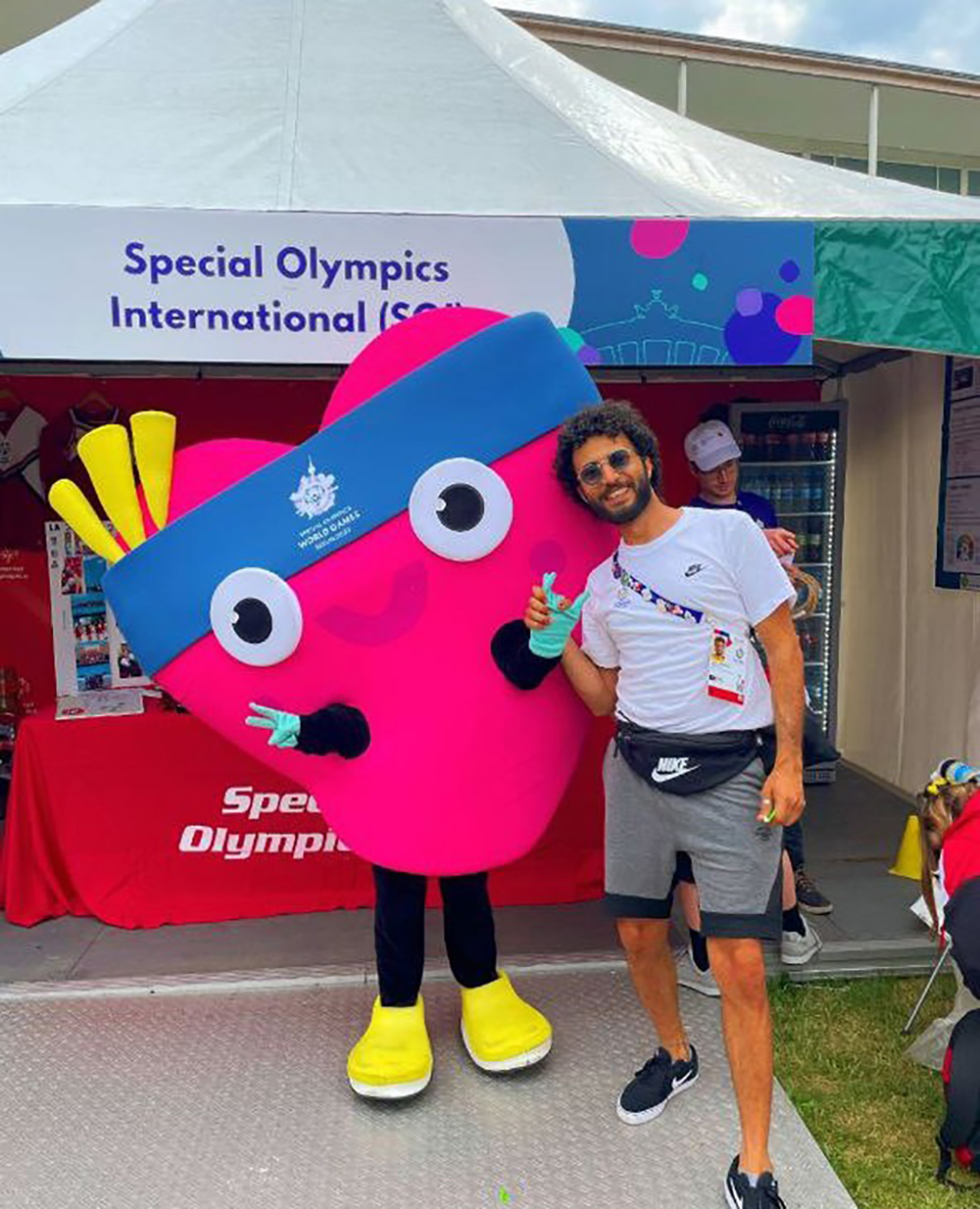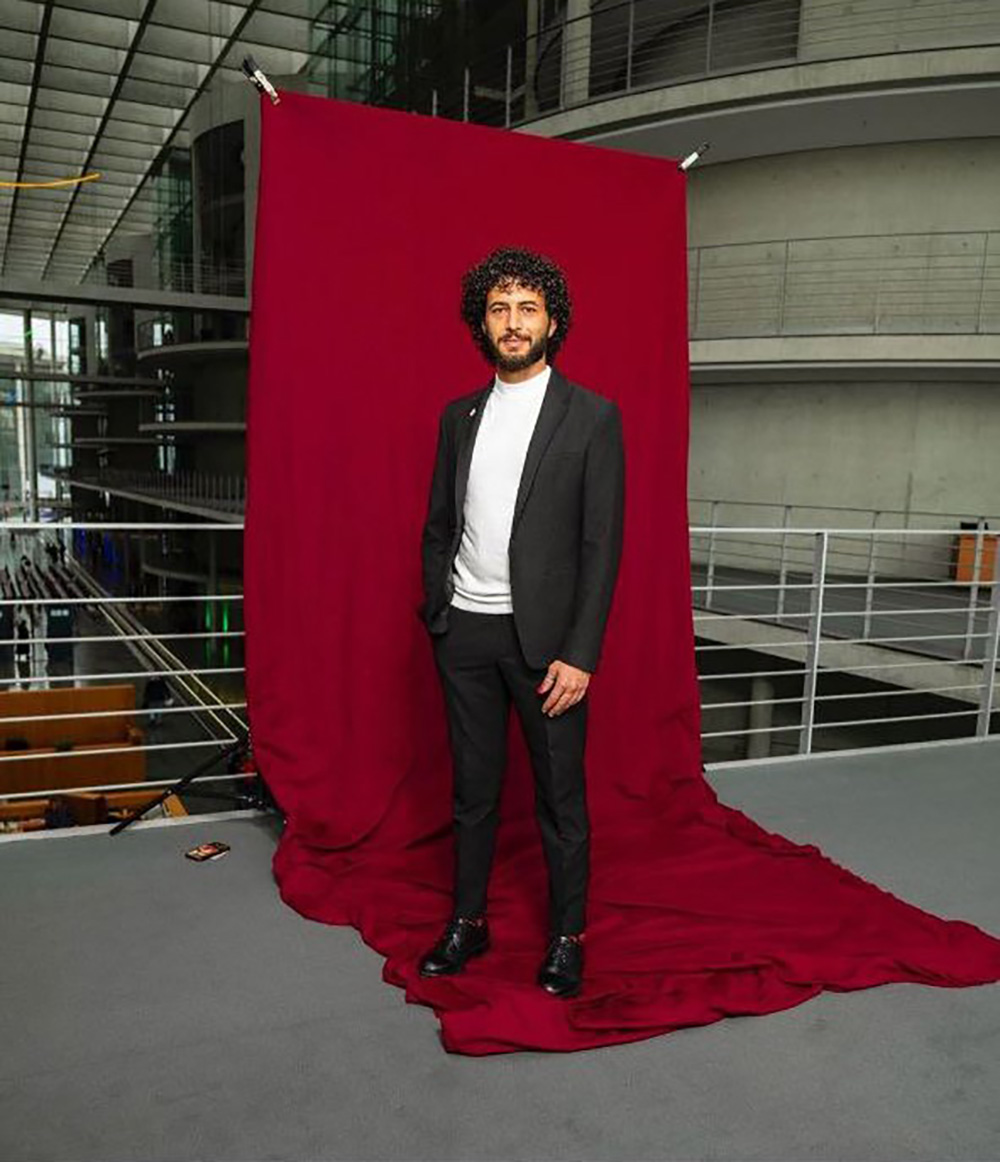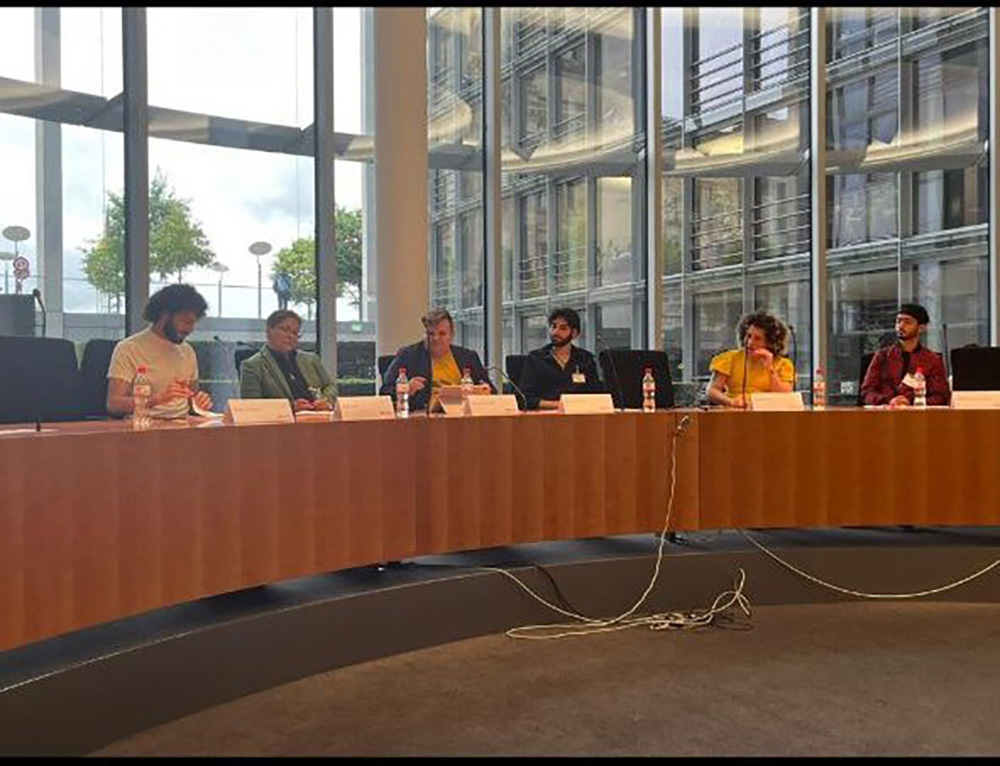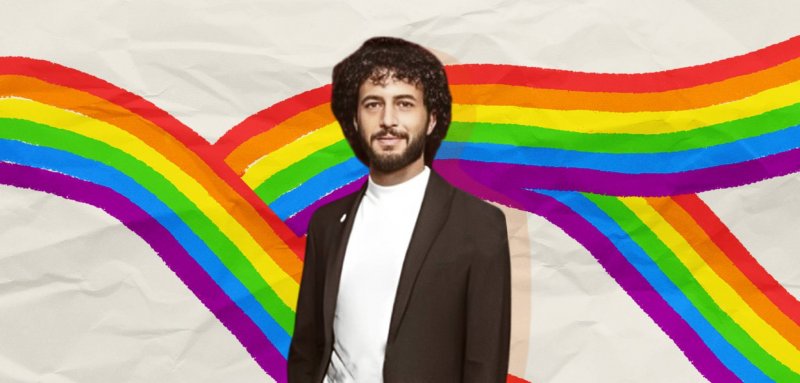Colored Stories: A dedicated space for vibrant stories belonging to individuals within the LGBTQIA+ community. These are stories of people who have overcome great challenges, shattered taboos, and left a strong mark in the public sphere or in the professional path they chose. Through their perseverance and effort, they have proven that success is not limited to sexual and gender identity, and that dreams are accessible to everyone without exception.
A trans woman suffering from a sensitive health issue entered a hospital in Beirut, but the supervising doctor refused to examine her, citing a lack of knowledge on how to handle her case. This incident took place in front of public health specialist and queer activist Hamza AlZahran, who asked himself, "How can an educated person refuse to treat a trans woman who is different from him? Is it due to lack of experience and training, or is it tied to religious, cultural, or traditional beliefs?" Hamza immediately stepped in to assist the patient, as he recounted to Raseef22.
This is just one of the challenges Hamza has faced in his work as a nurse and specialist in public and community health, and also as a queer individual. Yet, he has never stopped advocating for members of the LGBTQIA+ community and demanding their rights on all fronts.
 Public health specialist and queer activist Hamza AlZahran
Public health specialist and queer activist Hamza AlZahran
Public health specialist and queer activist Hamza AlZahran
Raising his voice
There was no specific moment when Hamza publicly announced his sexual orientation. He doesn't feel the need to wave the rainbow flag to belong to the LGBTQIA+ community or to express solidarity with them. Instead, he channels his differences by speaking out against any injustice or oppression faced by marginalized groups, whether they are LGBTQIA+ or other vulnerable communities. “We don’t always need to announce our sexual orientations. What’s more important is that we encourage others to join this community and support it,” he tells Raseef22.
Hamza further sheds light on the violations these groups face and how pinkwashing is used: "At a time when Israel attempts to use LGBTQIA+ rights, diplomatically and internationally, as a way to falsely claim and promote itself as the 'only haven' for queer people in the region, some of our countries are working to 'demonize' LGBTQIA+ individuals, and make them scapegoats to cover up and distract from major political issues in the Arab world, especially in Lebanon. We have always existed in Arab countries, but it is colonial laws that have ruined us. We’ve made achievements, but politicians do not contribute anything except criminalizing homosexuality.”
"At a time when Israel attempts to use LGBTQIA+ rights, diplomatically and internationally, as a way to falsely claim and promote itself as the 'only haven' for queer people in the region, some of our countries are working to 'demonize' LGBTQIA+ individuals, and make them scapegoats to cover up and distract from major political issues in the Arab world.”
Hamza was born in Germany and moved back to Lebanon with his family when he was seven. He completed his education and studied nursing, eventually starting his career in Beirut’s hospitals. “During my work, I gained experience about the healthcare system specific to LGBTQIA+ individuals in Lebanon, particularly for trans people, who face difficulty accessing healthcare,” he says.
He adds to Raseef22: “The healthcare was poor, and I saw it with my own eyes. It’s still etched in my memory because one day I could be in the same situation, or it could be someone I care about deeply.”
 Public health specialist and queer activist Hamza AlZahran
Public health specialist and queer activist Hamza AlZahran
Public health specialist and queer activist Hamza AlZahran
Hamza later pursued a master's degree in public health, specializing in health promotion and community health. He moved on to work with international organizations focused on primary healthcare, broadening his scope beyond treating specific individuals to working on humanitarian projects in Lebanon. These included health initiatives for victims of the 2020 Beirut Port explosion, the COVID-19 crisis, and projects concerned with the public health of Syrian refugees. "I always took advantage of my work position to provide care to all vulnerable groups, not just be an activist. I participated in drawing up healthcare plans and advocating for the inclusion of all LGBTQIA+ individuals in primary healthcare. I later worked in psychological first aid and supervised a number of trainings on this topic with several international organizations."
A trans woman suffering from a sensitive health issue entered a hospital in Beirut, but the supervising doctor refused to examine her, citing a lack of knowledge on how to handle her case. This incident took place in front of public health specialist and queer activist Hamza AlZahran, who asked himself, "How can an educated person refuse to treat a trans woman like that? Is it due to lack of experience and training, or is it tied to religious, cultural, or traditional beliefs?"
Hamza believes that many LGBTQIA+ individuals in Lebanon are denied proper healthcare due to “regressive laws and institutional discrimination,” which perpetuate bias across various services, including healthcare. “There are no laws protecting these people’s access to services, and unfortunately, the system in Lebanon isn’t held accountable for these violations. As a result, queer individuals are deprived of basic services, leading to a vicious cycle that exacerbates their vulnerability and leads to further marginalization,” he explains.
During his work, Hamza faced a great deal of criticism, verbal harassment, and even physical violence. Nevertheless, he remained determined to continue. He reveals that the poor experiences of trans individuals with healthcare services don’t just stem from the medical staff but begin the moment they enter the hospital, starting from admissions to billing and the accounting department.
Losing hope and returning to the German parliament
During the October 2019 revolution in Beirut, Hamza was one of the most prominent protestors who took to the streets, excited to see queer individuals actively participating. However, like many other young people in Lebanon, he lost hope by 2021 as the economic crisis began.
“We have always existed in Arab countries, but it is colonial laws that have ruined us. We’ve made achievements, but politicians do not contribute anything except criminalizing homosexuality.”
Reflecting on moments of despair and his decision to return to Germany, he says, “After so many setbacks, I say it now with pride: I gave up and left. But there are still many LGBTQIA+ people in Lebanon—some have stayed out of conviction, while others are looking to emigrate.”
Despite all these difficulties, Hamza didn’t lose hope after returning to Germany. Instead, he shifted his work from being a nurse and specialist to becoming an on-the-ground advocate. “My journey in Germany began with a project focused on protecting LGBTQIA+ refugees arriving here because the asylum system in Germany isn’t comprehensive in terms of safeguarding their rights. It’s a bureaucratic system that takes a lot of time.”
Hamza’s advocacy didn’t stop at defending Arab LGBTQIA+ refugees. He spoke on numerous human rights platforms in Germany, raising awareness about Beirut, a city often perceived as the only safe Arab capital for queer individuals. “German law still treats LGBTQIA+ refugees coming from Lebanon differently, based on the assumption that they’re arriving from a safe country. Yes, Beirut is relatively safe, and Lebanon is seen as a refuge for LGBTQIA+ people. But this is where my message and mission began in working to make Beirut a truly safe place for queer people.”
Hamza believes that many LGBTQIA+ individuals in Lebanon are denied proper healthcare due to “regressive laws and institutional discrimination,” which perpetuate bias across various services, including healthcare: “There are no laws protecting these people’s access to services, and unfortunately, the system in Lebanon isn’t held accountable for these violations. As a result, queer individuals are deprived of basic services, leading to a vicious cycle that exacerbates their vulnerability and leads to further marginalization.”
Hamza dedicated himself to this mission, addressing human rights officials at the White House, German representatives, and other advocacy groups. “I spoke to them about Beirut and the violations committed by certain security agencies against queer and trans people. Unfortunately, they weren’t aware of these abuses. That’s when I became the voice representing Lebanon and the Middle East. I was invited to a human rights conference held by the largest party in the German parliament, where I addressed the House of Representatives on two key points: LGBTQIA+ rights in the Middle East and LGBTQIA+ rights in Lebanon.”
 Discussions on LGBTQIA+ rights in the Middle East and Lebanon
Discussions on LGBTQIA+ rights in the Middle East and Lebanon
Discussions on LGBTQIA+ rights in the Middle East and Lebanon
Hamza adds, "What I was trying to convey to the parliament is that we are not asking you to take in Arab or Lebanese refugees, but rather to help them live with dignity in their own countries. Encourage unregistered support networks and organizations in Lebanon so that LGBTQIA+ individuals can access their natural rights to all services and live with dignity."
Hamza’s efforts extended beyond advocating for Arab LGBTQIA+ refugees in Germany. He worked tirelessly to amplify the voices of LGBTQIA+ individuals in Lebanon, bringing attention to the violations they face. A key issue he raised in the German parliament was calls by some Lebanese MPs to criminalize homosexuality in 2023 in response to a proposal to repeal Article 534 of the Penal Code, which states that "any sexual act against nature is punishable by up to one year in prison." He also documented the violations that occurred during the Freedom March in Beirut. Hamza presented a list of the Lebanese MPs who incited the criminalization of LGBTQIA+ people, pushing for serious action against them and helping submit reports on these violations.
As a result of his advocacy efforts, particularly within the German parliament, the German government responded by facilitating the asylum process for some LGBTQIA+ individuals from Lebanon who were in danger, providing them with assistance in relocating.
Along with a group of individuals of Arab descent, Hamza helped establish the Queer Arabs project, "a collective that celebrates the intersection of Arab and queer identities among people of Arab migrant origins living in Germany. It’s a project that connects us to our heritage and identity, allowing us to live and express ourselves without relying on the 'white savior' narrative that portrays Westerners as more civilized for accepting differences."
Hamza comments on this development: "There are safety networks in Lebanon concerned with LGBTQIA+ rights, and alternative media plays a crucial role in advocating for these causes. This is what keeps us alive in Lebanon. Another conference on LGBTQIA+ rights is expected to take place this year. Unfortunately, Europe is currently experiencing a rise in far-right extremism, which has pushed LGBTQIA+ issues off the priority list, affecting queer individuals in Germany, especially those of migrant backgrounds."
The Queer Arabs project and linking it to history
From the German parliament to grassroots activism, Hamza continued his advocacy for LGBTQIA+ rights. Along with a group of individuals of Arab descent, he helped establish the Queer Arabs project. “This is a collective that celebrates the intersection of Arab and queer identities among people of Arab migrant origins living in Germany. It’s a project that connects us to our heritage and identity, allowing us to live authentically and express ourselves naturally, without relying on the 'white savior' narrative that portrays Westerners as more civilized for accepting differences, while our countries continue to criminalize diversity."
The project includes awareness activities on various topics related to LGBTQIA+ people and their integration in Germany. There will also be a conference on the history of sexual diversity among Arabs. The goal is to send a message to politicians not to "demonize" sexual orientations or scapegoat LGBTQIA+ people to cover up political failures. "We will say that we have a rich history of celebrating diversity, and that the regressive laws currently in place in our countries are mostly colonial-era laws introduced during European colonial periods."
"What I was trying to convey to the parliament is that we are not asking you to take in Arab or Lebanese refugees, but rather to help them live with dignity in their own countries. Encourage unregistered support networks and organizations in Lebanon so that LGBTQIA+ individuals can access their natural rights to all services and live with dignity."
As a result of his political activism and work supporting the most vulnerable, Hamza received an offer from a company in Berlin to create the "Berlin-Beirut Tour" project. This tour explores the historical safe spaces for LGBTQIA+ people in Berlin, especially among migrants, particularly Arabs. “The idea is to research German history and learn how these communities maintained safe spaces after years of persecution. The project also links back to Beirut to highlight the importance of diversity, especially in light of the rise of the far right and its parallels with what’s happening in Beirut and other Arab countries. This shows that we should never take our safety for granted; we must fight to maintain it, because history repeats itself, and we can learn from Germany's past during the Nazi era and before that.”
Hamza concludes with a message to LGBTQIA+ individuals in Lebanon and the Arab world: “Everyone is fighting their own battle, and we shouldn’t put pressure on ourselves. We need to stay safe based on each person’s situation. But the most important idea is to learn from history about how marginalized groups have been able to survive and win their rights over time. We must stand together and fight to create a better future for queer people. I’m sure we are writing history, and those who follow us will speak of what we did. Let’s work toward writing an honorable history that ensures social justice for all.”
Raseef22 is a not for profit entity. Our focus is on quality journalism. Every contribution to the NasRaseef membership goes directly towards journalism production. We stand independent, not accepting corporate sponsorships, sponsored content or political funding.
Support our mission to keep Raseef22 available to all readers by clicking here!
Interested in writing with us? Check our pitch process here!





